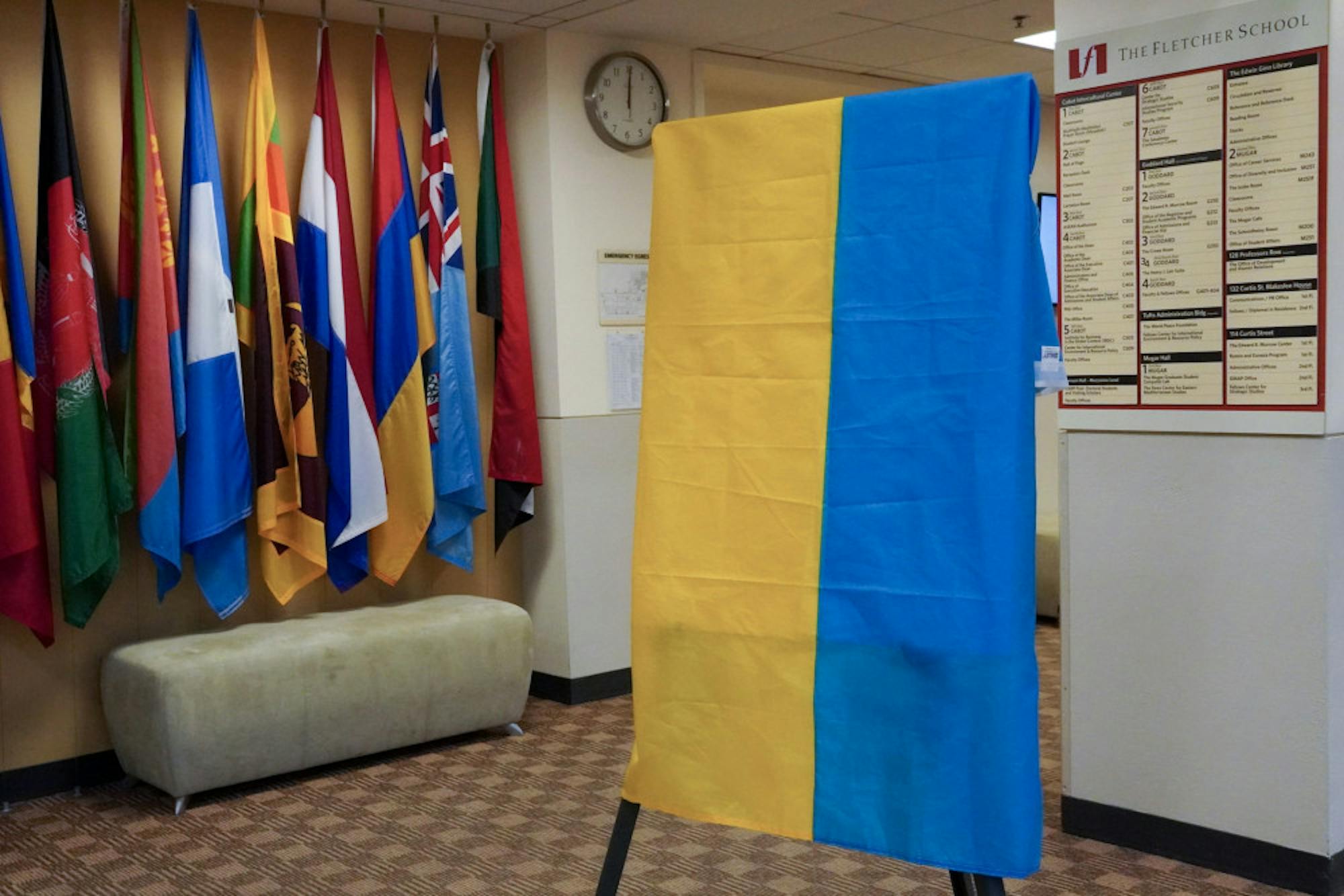The Fletcher School hosted a panel titled “How Has the Russia-Ukraine War Changed the International Security Environment?” on Feb. 27. Chaired by Monica Toft, the director of Fletcher’s Center for Strategic Studies, the discussion included Professors Daniel Drezner and Kelly Greenhill, and visiting scholars Pavel Luzin and Volodymyr Dubovyk, who is affiliated with Odesa I. Mechnikov National University in Ukraine.
Panelists explored the economic, security and regional implications of the war, examining the impact of the invasion of Ukraine a year after the conflict began. Arik Burakovsky, assistant director of the Russia and Eurasia Program at Fletcher, shared his insights on the thought process that went into structuring the event in an interview with the Daily.
“The Center for Strategic Studies … [was] interested in finding a way to mark the one-year anniversary of the war, and, of course, we started with the big puzzle: Why were experts surprised that the war even happened, and then why do they continue to be surprised that the war is not yet over?” Burakovsky said. “We really wanted to focus on international security because that’s a significant interest of many Fletcher students. … We wanted to convene a group of panelists who could speak on a variety of cross-cutting issues.”
Rachel Kyte, dean of The Fletcher School, opened the event, addressing the role Fletcher has in answering questions the Russia-Ukraine war sparked.
“What does [the war] mean for the norms of large power behavior?,” Kyte asked. “What does this mean for neutrality? … While I hope that peace will come soon to Ukraine, it’s our job at Fletcher to roll our sleeves up and try to understand and try to pick a way forward.”
Toft began the discussion by sharing statistics from the conflict.
“Russia is firing, on average, 20,000 artillery rounds a day. … Ukraine is firing [4,000 to 7,000],” Toft said. “$166 billion in military, financial and humanitarian aid has been pledged to Ukraine by supporting two different countries, so this is truly an international war with serious global security implications.”
Toft then asked Drezner to explain what the war means for the global economy. He addressed the changing regional dynamics between President Vladimir Putin and the European Union from an economic perspective.
“The question going forward is in terms of the economic effects, the most significant, I think is that Russia has lost its energy in a way that it had been threatening for 10 to 15 years over the European Union,” he said. “The EU needed Russian natural gas and oil in order to be able to have relatively low energy costs. … The real question you have to ask … is how much are we moving from what had been perceived as a pretty globalized economy, to one that is dominated by economic blocs?”
Greenhill then discussed how perceptions on conventional war were disproved by the invasion.
“The claim that was out in the world that conventional war is dead … is bunk,” she said. “The obituary for international war was premature by a little bit, but Russia’s failure to overtake Ukraine … as anticipated, will now … spell the death knell of conventional conflict.”
She also touched upon the possibility of nuclear conflict through a spiral escalation model, a scenario with deadly implications.
Toft then shifted the focus of the discussion from the international to the regional, turning to Luzin, who spoke about the domestic impact of the war on Russia.
“One year of the war … eliminated a significant part of [the] beneficiaries of this war,” Luzin said. “On Feb. 24, 2022, there were tens of millions of Russians who supported Putin, who supported [the] Russian army in this aggression. Currently … [these] numbers decrease. Why? Because people lost much more.”
Luzin elaborated that Putin’s support has eroded because of the war’s death toll, even while Russia provides money to the families of killed soldiers.
“Even if [Russian citizens] are completely pro-Putin, even if they send their husbands, sons to the war and got some money with dead bodies of husbands and sons and brothers and so on … But what do you do with this money?” Luzin proposed. “This money [is] in rubles and these dead bodies? They will never be resurrected.”
Professor Volodymyr Dubovyk rounded up the panel with his interpretation of the current political situation in Ukraine.
“Ukraine is not some country where you have a monopoly on power by Zelensky,” he said. “Yes, he has high ratings, he’s an international rockstar, but at the same time, he has a parliament to deal with, the opposition and the media, this vibrant civil society and so on. … Ukraine is still there. It hasn’t disappeared from a political map. Apparently, it’s going to be there, you know, as a sovereign state. We don’t know with what exact borders, but it will, so that’s already a major victory.”
Later, the panel broke for questions, and discussed a range of topics, including Chinese-Russian relations, the Russian elections of 2024 and the possibility of Ukraine joining the EU, with questions from students that brought the event to a close.
“The hope is that students got a better understanding of the Russia-Ukraine war, of the various international security dynamics that are at play.” Burakovsky said. “And also thought about what the future … will be. I think it’s anyone’s guess when this war will end.”






